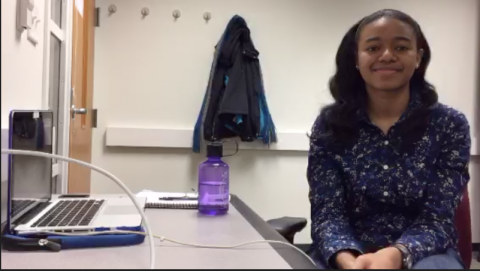April 12, 2016
By Rachael Hanley
From the time she watched her first XMen movie, Ashley “Monty” Montgomery has been, as she admits, obsessed with superheroes.
The Amherst senior traces this obsession to her dad who, when she was younger, let Montgomery and her brother indulge in weekends of Star Wars and Star Trek.
By the time she left for college, superhero movies were Montgomery’s cure for homesickness; they were how she wanted to spend those rare chunks of free time. They were also what inspired her to sign up for a class, that would lead to a paper, an independent study, a radio show, and some intriguing discoveries about the treatment of genders.
On Saturday, Montgomery played the culmination of her work, an audio documentary called “What does a Superhero Sound Like? An Audio Analysis of Gender, Media, and Technology,” during her evening show on WAMH 89.3 FM. The full broadcast is also available on her blog: superherosounds.wordpress.com

Montgomery said recently that the documentary—an independent research project funded by the English department and the James Charlton Knox Prize—was inspired by both a love of broadcast journalism and her experience in the class “Rhetorics of New Media” with visiting professor Matt Tierney.
For her final essay in that class, Montgomery wrote 15 pages on the feminist patterns in Captain America: Winter Soldier, and said it was “the most enjoyable paper I’ve ever written.”
After the class was over, Montgomery created “The Superhero” show on WAMH, which gave her a platform through which to ask questions about gender and media of a larger audience.
“I’d go to people and ask them to name as many female superheroes as they could in 30 seconds and as many male superheroes as they could in 30 seconds,” Montgomery said. Most people could name a dozen men, but only one or two women, she said.
During the course of her research, Montgomery said she came to a startling discovery: not only were males in the superhero genre not as adaptable as they seemed to be, but the females were always in the process of saving their counterparts—while also getting less of the glory.
“Women have the power to be the star,” she said. “They’re not actually powerless, they’re just pretending to be.”